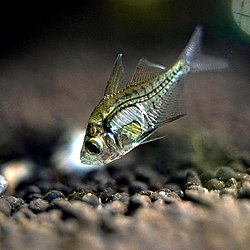Indian Glassfish (Parambassis ranga)
From The Aquarium Wiki
Indian Glassfish
Parambassis ranga
95 Litres (25 US G.)
6.1-7.9cm (2.4-3.1 ")
7.0 - 8.0
20 -30 °C (68-86°F)
9-19 °d
1:1 M:F
5-6 years
Family
Ambassidae
Contents
Additional names
- Indian Glassfish, Indian Glassy Fish, Disco Fish
Additional scientific names
- Chanda ranga, Ambassis ranga, Pseudambassis ranga
Sexing[edit]
- Male has a pointed swimbladder, whereas females' are rounded. Males also have blue edging on the dorsal and anal fins and have slightly deeper yellow colouration on the body than females. These colours are at their most vibrant when the fish are spawning.
Tank compatibility[edit]
- This species can be kept in communities, but such a community needs to include calm species such as Cherry Barbs or Dwarf Rainbowfish in a freshwater set up. Male Indian Glassfish can become territorial when spawning but physical damage is rare. Males can be identified by their pointed swim bladder, whereas females have a more rounded one, a slight yellow tinge to their bodies and a blue edging on their dorsal and anal fins. The males' colors are much more vibrant when they are in spawning condition.
Diet[edit]
- Will not live on flake alone, and live and frozen foods should be offered regularly.
Feeding regime[edit]
- Once or twice daily.
Environment specifics[edit]
- This is not actually a brackish water species despite popular belief and does best in freshwater that is slightly acidic to slightly alkaline, pH 6.5 to 7.5. Should be provided areas of cover in the from of plants and other décor.
Behaviour[edit]
- Can be rather shy, but larger shoals tend to be much bolder.
Identification[edit]
- Glassfish are known to be victims of the fad to have Dyed Fish. These fish traditionally have a transparent high-sided body with visible skeleton. If they are found with any hint of unnatural looking colour, they have been dyed and should not be purchased.
Pictures[edit]
External links[edit]
- Fishbase (Mirrors:
 )
)
